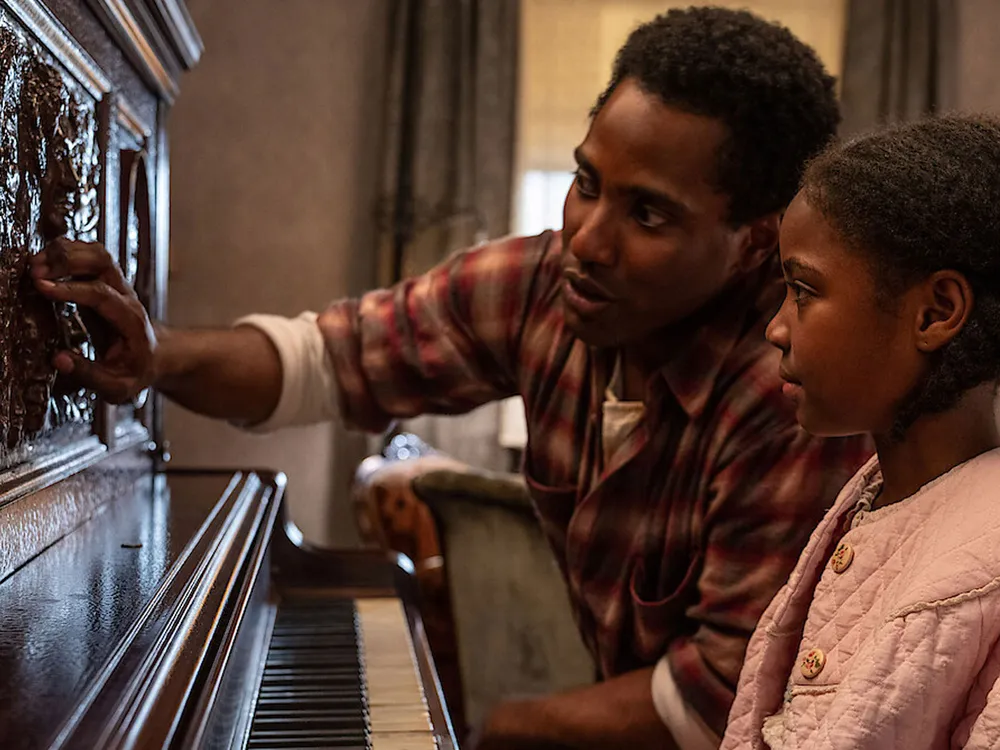2024’s November movie slate has been all over the place. From wannabe blockbuster box office fiascos like Red One to an attempted reproduction of last year’s Barbenheimer with Glicked (Gladiator II & Wicked), November has been the most eventful month for movies so far. And now with Moana 2 setting the box office ablaze, the idea of theaters dying is looking less and less likely. Before the full scale of the 2024 slate was announced, this year was thought of as a soft year, with one or two heavy hitters but not much else in the way of real Oscar-worthy films. However, this year has introduced an interesting and unpredictable Oscar race for Best Picture, and with more movies to come, the 97th Oscars is looking to be the most up in the air in a long time.
There are four movies from November that are both deep in Oscars contention, but also make a fascinating quadruple feature. These movies are A Real Pain, Jesse Eisenberg’s second directorial effort, Emilia Pérez, French darling auteur Jacques Audiard’s genre-bending musical, Gladiator II, Ridley Scott’s legacy sequel to his original Best Picture winner, and The Piano Lesson, Malcolm Washington’s (Denzel Washington’s son) adaptation of August Wilson’s play of the same name.
I will lead you from worst to best. Emilia Pérez is a Netflix movie from French director Jacques Audiard. It stars Karla Sofía Gascón as the titular Emilia Pérez, a cartel kingpin who attempts to leave the Mexican mob and transition into being a woman. Along with Karla Sofía Gascón, the movie has a stellar cast of Latin actors. Selena Gomez, who plays Gascón’s wife pre-transition and Zoe Saldaña, who plays a lawyer arranging Gascón’s transition surgeries also lead the Spanish speaking cast, and are two of the most famous actors of Latin descent in Hollywood right now. The film was shot both during and after Gascón’s real life transition, and treats the subject matter as Gascón would like it to be treated; commonplace. The movie treats the idea of transgenderism as fact, and doesn’t mingle on politics or arguments about pronouns, which is quite refreshing.
However, the movie itself is not great. Risky movies that mix genres and tone can be some of the most interesting, innovative and excellent movies. The Godfather uses a mafia backdrop in order to portray a dark family drama with an operatic tone, and is widely considered the greatest movie of all time. But Emilia Pérez is definitely not The Godfather. In this case, the intense tonal jumping between a Sicario-esque cartel plot to an emotional adaptation of an opera is so incredibly jarring that the movie feels impenetrable. The best movies are those that you can really sink your jaws into, and this movie is a jawbreaker. It feels like it is trying to put so much in front of you as though to blind you from the film’s ultimate failed conceit. This film is as interesting as it is frustrating, so be prepared to be constantly puzzled by the way this movie navigates the world it has set up for itself. This movie is a scrambled Rubik’s Cube with three pieces missing, and director Jacques Audiard is helplessly out of his depth trying to find them. His failure to balance the genre switching is ultimately the downfall of this movie.
However, that is not to say that it is all bad. Zoe Saldaña is insanely good at everything that this movie asks her to do. She is incredible in the ineptly staged action sequences, perfect in the interestingly shot dance sequences, and the emotional heart of the movie. Karla Sofía Gascón is great as well, and the complexity of her performance feels lived in and complex, mainly because she herself has lived the life of both a man and a woman. Selena Gomez, however, is easily the weak link of the otherwise all star cast. Gomez is best known for her comedy work, but the scenes she performs in are almost always heavy and dramatic. She is a much less convincing performer, and lacks the complexity of the other two leads.
The opera part of this film is interesting as well. The movie is marketed as a musical, but due to its roots in opera, it is devoid of singable music. The songs are all bad, and feels more like the actors are singing their dialogue to progress the plot, and not really to expose anything else about themselves. The main thesis of the film is about one’s inability to outrun their past, and while this movie feels like it is pushing the envelope of inclusive filmmaking, the overall message is not one of hope. On top of this, an already convoluted plot makes this movie only accessible to film buffs and cinephiles. Overall, Emilia Pérez is an odd – yet interesting – failed experiment of genre mixing.
The next film on this November list is The Piano Lesson. For years now, Denzel Washington has been trying to put playwright August Wilson’s work into the spotlight, and whether that is big budget broadway endeavors or smaller budget movies that feel like chamber dramas, Washington’s work has been rewarded greatly. His directorial adaptation of Wilson’s Fences won Viola Davis an Oscar, and now his son, Malcolm Washington, is looking to win Danielle Deadwyler her first oscar in his new feature: The Piano Lesson. This movie is really, really good. Fences can often feel incredibly stage-like, and while it is a play, at any film’s heart should be a movie, and at Fences heart, there is only a play. However, The Piano Lesson is not wildly abridged, but is enough so to feel like not just an adaptation of a play, but also like a singular film from an up and coming artist.
The Piano Lesson centers on an estranged Black family living in Pittsburg who are the owners of an intricately carved familial heirloom-a one of a kind piano. However, when the brother of Danielle Deadwyler’s Berniece, Boy Willie, (Played by John David Washington, Denzel Washington’s other son and Malcolm Washington’s Brother) comes to town looking to sell the piano in order to purchase family land stolen by white supremacist back south, the true nature of the piano reveals itself. This movie has a stacked cast, and among Deadwyler and Washington are Sam Jackson(!), Corey Hawkins, and Ray Fisher. The push pull of old generation stars mixed with younger stars really adds to the effectiveness of the film’s ideas. Everyone is really good in this movie, but Danielle Deadwyler and Ray Fisher in particular are the two to watch for.
This film is intricately built and has a large ensemble for its small, chamber drama-esque nature, and poses an interesting mystery for its viewer to uncover. The genius of this movie stems from its title-The Piano Lesson. As the story unfolds, certain supernatural things begin to occur when Boy Willie is trying to remove the piano from its home in Pittsburg. In the final act, it turns into a horror movie, in which ghosts and hauntings are prevalent. The final act genuinely has you worried for the characters physical safety, and for a play to do that is very hard. Going into the film, a movie titled The Piano Lesson would have you think that it will be about a family in which music is passed down generation to generation. But the truth is much more dark and interesting. The piano’s real symbolism is about generational trauma and the weight our ancestors place upon our shoulders to uphold their legacy, even if unintentional. That idea is really well executed in this film, and the movie’s violence accentuates it in a really interesting way. Many movies that would appear to devolve into more genre cliches often have serious third act issues, but this movie doesn’t feel like it devolves. Instead, it feels like it evolves into a more opaque film about family legacy. The ties felt to one’s past in this movie are felt deeply, and that is a real feat of filmmaking.
The ideas, performances, and consistency of this movie all really recommend it to even casual film viewers. However, that doesn’t mean it is devoid of problems. The last act is well done from an emotional perspective, but is not executed the way a pantheon genre filmmaker would capture this. It is a passable set piece, but is also pretty visibly not directed by John Carpenter. Also, the film can feel rather cramped sometimes, and the house it is set in doesn’t do the actors any favors in terms of interesting blocking. Corey Hawkins plays Danielle Deadwyler’s quasi-love interest, but his character feels somewhat undeveloped. Sam Jackson is reliably great, but fits right into the middle of his range, and so the character simply isn’t interesting. Overall, this movie is really great at getting its point across succinctly making it an enjoyable movie.
The next movie on this long and winding road of a review is Gladiator II. Ridley Scott makes movies of varying quality, but one thing is certain when you walk into a screening of one of his films – entertainment value. Not once in a Ridley Scott theatrical experience have I been bored, and his signature kineticism is what makes him one of the greats. Gladiator II is no exception, and is genuinely an incredibly fun movie to watch. Paul Mescal stars in this film as the son of Russel Crowe’s Maximus from the previous film, and while his action star chops are on par with Crowe’s acclaimed performance, his line delivery in big moments can be lackluster. Denzel Washington is also in this film as this movie’s version of Oliver Reed’s Proximo from the original. However, as the movie continues, it becomes clear that he has other aspirations beyond the gladiatorial arena. The best way to describe Washington’s performance is Dementus from Furiosa mixed with Anthony Hopkins’ Hannibal Lecter. Denzel is too good for this movie. Everything he does evokes a response, and when he is not in frame, you are looking for him. His gravitas, his inevitability, his subtle eroticism, and his violent outbursts are all perfectly calculated to fit his setting. Along with Mescal and Washington, this movie’s cast is loaded with supporting performances from Connie Nielsen reprising her role, Pedro Pascal as Nielsen’s new husband and general of Rome, and Joseph Quinn as one of the twin emperors. Pedro Pascal is underutilized and underwritten. He does the best with his limited material, but is ultimately a real weak link. Connie Nielsen is supposed to be the emotional heart of this movie, but given her role as bystander and ultimate enabler in the original film, her emotional weight lacks any real punch.
This movie was shot in fifty-one days, which is unheard of for a blockbuster, and didn’t have a real script. They attempted to Fury Road this movie, and that shows severely as the original is tightly written while this one loses plot threads every fifteen minutes. But part of this does work as it always keeps you guessing, and while it is structurally very flawed, it is never boring. This film is a Ridley Scott movie, and so on a technical level it is very precise. However, there is an over reliance on sloppy CGI and VFX that undercut the film’s visceral nature and take you out of the movie. This movie will not be the Oscar juggernaut its predecessor was, but overall works as an entertaining movie that isn’t overwrought with emotion or uninteresting, even if slightly underwritten.
A Real Pain is the new film from actor Jesse Eisenberg in his second directorial outing, and is the most Oscar worthy movie on this list, followed closely by The Piano Lesson. However, The Piano Lesson is so focused on its genre leanings that as much as I hope it gets nominations or even wins at the Oscars, it is not typically the type of movie the Academy rewards. However, A Real Pain is. This film is a story about cousins going on a trip to visit their late grandmother’s old home in pre-holocaust Poland, and the best description of this movie tonaly is if Alexander Payne’s Sideways and Noah Baumbach’s The Squid and the Whale had a baby. Director Jesse Eisenberg stars in this movie alongside Succession actor Kieran Culkin. Eisenberg’s performance is that of a boring person who is utterly ordinary in every sense of the word, except that he is somehow able to afford a Brooklyn brownstone as an ad banner (ads seen on the sides of websites) salesman(?!). Kieran Culkin, however, is the opposite. He plays essentially his character in Succession, only in a less exaggerated caricature. He is equally as charming, smarmy, and mean as his character in Succession, but he is able to reach deeper into his character in this film than that show ever allowed. In this, he is transcendent. In many buddy movies, the form of comedy is truly situational. Midnight Run, Lethal Weapon, and Sideways are all examples of situational comedy. But here, the comedy sprouts from its central characters, which is a refreshing take on road trip and buddy movies in general.
Performances aside, the content of this movie is very timely. Much of it is about trauma, and how trauma impacts the way we interact with others. As the movie goes on, it is said that Kieran Culkin’s character attempted suicide early that year. This is information that helps us understand why Jesse Eisenberg walks on eggshells around him and why Culkin’s character is so unhappy. The great thing about this movie is its consistency. The performances, laugh lines, and dramatic tension are deeply thought out and conveyed in a consistent way that makes the whole film feel cohesive and satisfying. The movie is bracing and intense, but also funny and sad. It is maybe the most human movie out of all of these films, and feels lived in and real.
However, this movie is not without faults. It is probably the most visually boring out of all of these movies, with the exception of a couple of truly gut wrenching images of the price of war. Thematically this movie is very interesting, but feels so invested in the Kieran Culkin character that the ideas of post war trauma and generational responsibility fall to the wayside in order to allow Culkin to take over. Culkin is so dominating that it is emotionally exhausting and taxing to spend time with that character. By the end of the film you are almost relieved to be done with it, which is probably the point due to the subject matter, but as a viewer many will find it to be too much.
In terms of Oscar chances, Gladiator II will surely get some below the line nominations, especially due to the lack of superhero movies or other blockbusters. However, The only above the line categories that it could possibly get into are best supporting actor for Denzel and maybe best picture, mainly due to its predecessor’s lasting impression on many Academy voters. Emilia Pérez will probably get six or seven nominations, mainly for screenplay and acting awards, as well as best picture. Whether it will win or not is seriously up in the air as reception to that film has been extremely polarizing. The Piano Lesson will surely get a best adapted screenplay and best picture nomination, but hopefully it will also earn Danielle Deadwyler an acting nomination as well. And finally, A Real Pain will get its two leads acting nominations, and will also earn screenplay and picture nominations as well. However, its lack of visual verve will surely knock it out of any other contention below the line.
These four November films really stuck out to me since they are all thematically linked. The common thread in these movies are their various ideas about people’s past and ancestral responsibility. Emilia Pérez is a film that debates whether or not you can abandon your past and whether or not you can truly get away from it. The Piano Lesson is a film about one’s responsibility to past generations through the lens of materialism and sentimentality. Gladiator II is a film about family legacy and continuing your ancestors’ work. A Real Pain is a film about finding yourself in your past and generational trauma. These common themes are interesting because it signifies a shift in modern Hollywood storytelling. One of the first masterpieces of the medium was Fritz Lang’s 1927 film Metropolis. This film is a portrait of the future through the lens of the roaring 20’s, a time marred by poor workers laws and the ultra rich one percent. And Hollywood ever since has been fascinated by what the future may hold, and countless films interrogate futuristic themes including Blade Runner, Terminator, The Matrix, The Planet of the Apes, and Star Trek. However, the advent of cell phones and new GPS technology are able to defy old movie tropes, leading many filmmakers to look to the past in order to tell their stories. By telling stories about the past, filmmakers are able to work around logistical problems that technology poses. Monumental shifts in Hollywood are hard to come by, and this change in storytelling will be one to keep an eye on.





